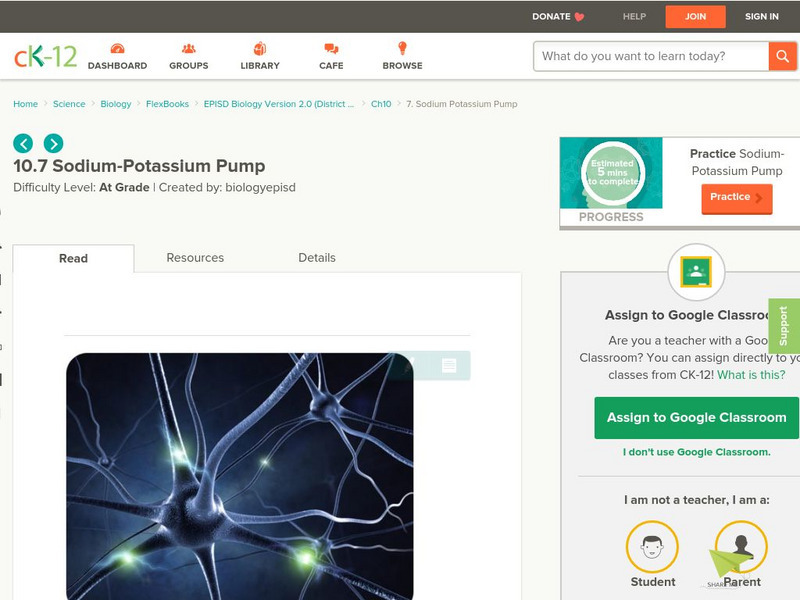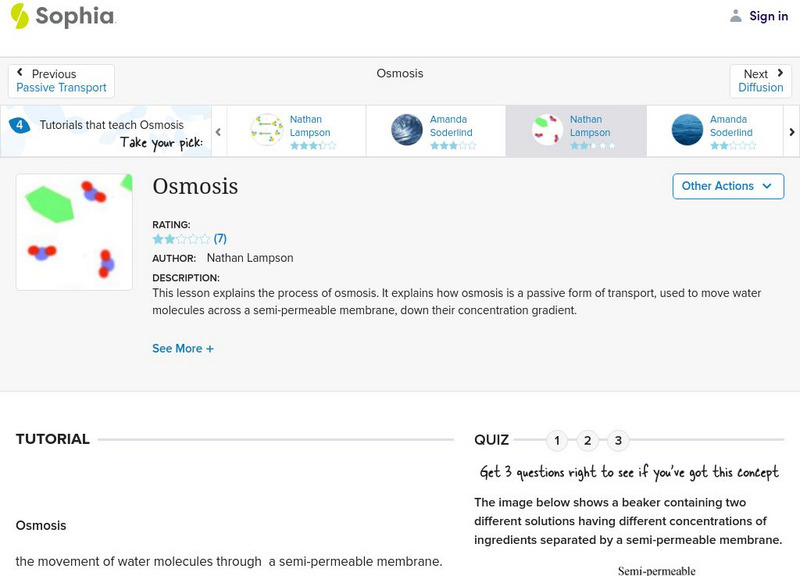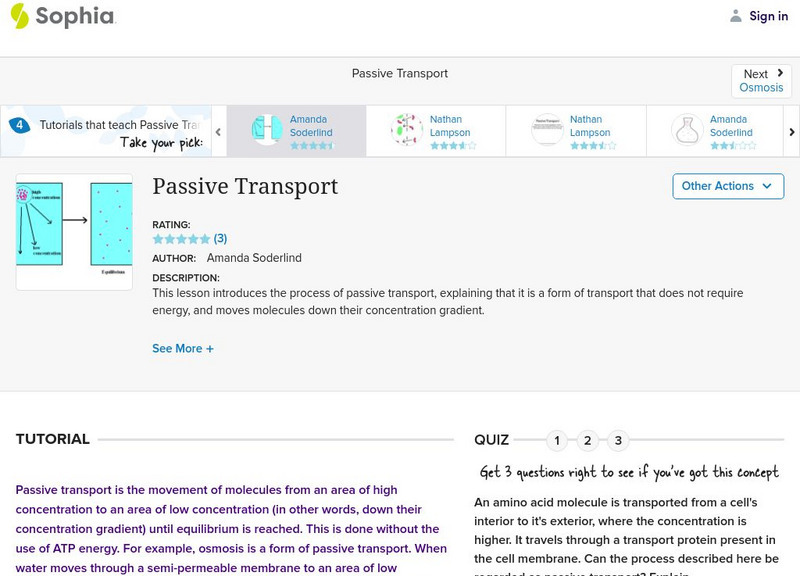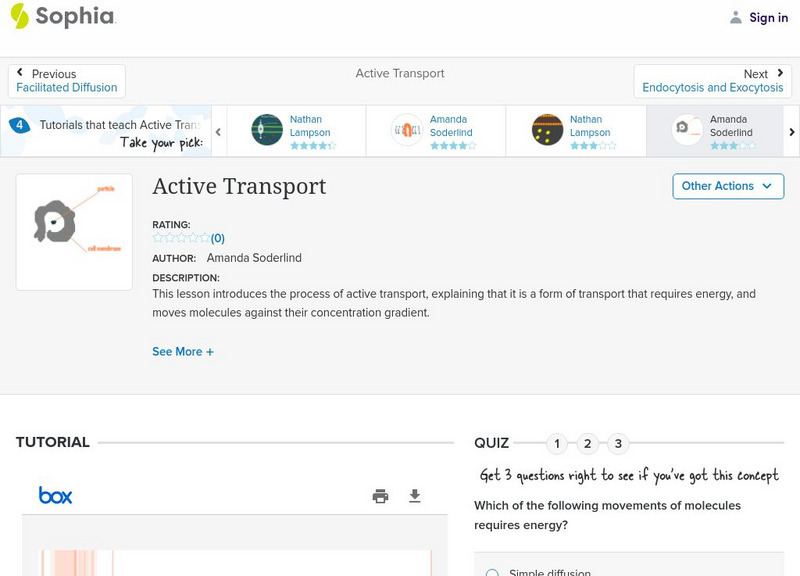Curated OER
Cell Size and Shape; Diffusion and Osmosis Processes
Use salmon eggs as a cell model for demonstrating the movement of water over concentration gradients. Junior scientists examine the same process microscopically with an onion cell. They use a thistle tube and a semipermeable membrane to...
Florida International University
Are You Concentrating?
Explore the importance of a concentration gradient in the rates of dissolution. Using the ocean ecosystem, learners study rates of dissolution around coral reefs. A hands-on experiment helps individuals discover the effects of changing a...
Gallantsbiocorner.com
Cell Membrane & Transport
Young scientists demonstrate their understanding of cell transport on this comprehensive worksheet. Focusing on cellular structure and the different processes that allow materials to move into, out of, and throughout animal cells, this...
Curated OER
Osmosis in Potato Slices
You may find this presentation helpful in setting up the classic experiment where potato wedges are used for observing the effects of osmosis. You can view the experimental setup in the text and a lab sheet in the pictures, but you will...
Curated OER
WET Science Lesson #5: Pass the Salt Please! (How Road Salt Affects Wetlands)
As an anticipatory set, biologists listen to the story of Ruth Patrick, a scientist who used algae to detect water quality. They observe a demonstration of osmosis and diffusion. In their lab groups, they place Elodea stalks in...
Curated OER
Passive and Active Transport
In this transport worksheet, students compare and contrast the characteristics and examples of active transport and passive transport. This worksheet has 1 graphic organizer and 11 short answer questions.
Macmillan Education
W.h. Freeman Publishing: Active Transport
Moving materials across the cell membrane sometimes requires energy, called active transport. This tutorial covers both primary and secondary active transport with good clear animations.
CK-12 Foundation
Ck 12: Diffusion
[Free Registration/Login may be required to access all resource tools.] Tutorial defines passive transport, semipermeable, and diffusion. Students will learn the significance of a concentration gradient and be able to list the three main...
CK-12 Foundation
Ck 12: Sodium Potassium Pump
[Free Registration/Login may be required to access all resource tools.] Tutorial explains the function of the sodium-potassium pump. Students will learn the difference between a concentration gradient and an electrochemical gradient.
Sophia Learning
Sophia: Passive Transport: Lesson 2
This lesson introduces the process of passive transport, explaining that it is a form of transport that does not require energy, and moves molecules down their concentration gradient. It is 2 of 4 in the series titled "Passive Transport."
CK-12 Foundation
Ck 12: Biology: Active Transport
[Free Registration/Login may be required to access all resource tools.] Introduction to active transport.
Sophia Learning
Sophia: Diffusion: Lesson 2
This lesson explains the process of diffusion. It explains how diffusion is a passive form of transport, used to move molecules down their concentration gradient. It is 2 of 8 in the series titled "Diffusion."
Sophia Learning
Sophia: Diffusion: Lesson 4
This lesson explains the process of diffusion. It explains how diffusion is a passive form of transport, used to move molecules down their concentration gradient. It is 4 of 8 in the series titled "Diffusion."
Sophia Learning
Sophia: Osmosis: Lesson 2
This lesson explains the process of osmosis. It explains how osmosis is a passive form of transport, used to move water molecules across a semi-permeable membrane, down their concentration gradient. It is 2 of 8 in the series titled...
Sophia Learning
Sophia: Osmosis: Lesson 4
This lesson explains the process of osmosis. It explains how osmosis is a passive form of transport, used to move water molecules across a semi-permeable membrane, down their concentration gradient. It is 4 of 8 in the series titled...
Sophia Learning
Sophia: Osmosis: Lesson 1
This lesson explains the process of osmosis. It explains how osmosis is a passive form of transport, used to move water molecules across a semi-permeable membrane, down their concentration gradient. It is 1 of 8 in the series titled...
Sophia Learning
Sophia: Passive Transport: Lesson 3
This lesson introduces the process of passive transport, explaining that it is a form of transport that does not require energy, and moves molecules down their concentration gradient. It is 3 of 4 in the series titled "Passive Transport."
Sophia Learning
Sophia: Passive Transport: Lesson 4
This lesson introduces the process of passive transport, explaining that it is a form of transport that does not require energy, and moves molecules down their concentration gradient. It is 4 of 4 in the series titled "Passive Transport."
Sophia Learning
Sophia: Passive Transport: Lesson 1
This lesson introduces the process of passive transport, explaining that it is a form of transport that does not require energy, and moves molecules down their concentration gradient. It is 1 of 4 in the series titled "Passive Transport."
Sophia Learning
Sophia: Active Transport: Lesson 2
This lesson introduces the process of active transport, explaining that it is a form of transport that requires energy, and moves molecules against their concentration gradient. It is 2 of 4 in the series titled "Active Transport."
Sophia Learning
Sophia: Active Transport: Lesson 4
This lesson introduces the process of active transport, explaining that it is a form of transport that requires energy, and moves molecules against their concentration gradient. It is 4 of 4 in the series titled "Active Transport."
Sophia Learning
Sophia: Active Transport: Lesson 1
This lesson introduces the process of active transport, explaining that it is a form of transport that requires energy, and moves molecules against their concentration gradient. It is 1 of 4 in the series titled "Active Transport."
Sophia Learning
Sophia: Diffusion: Lesson 1
This lesson explains the process of diffusion. It explains how diffusion is a passive form of transport, used to move molecules down their concentration gradient. It is 1 of 8 in the series titled "Diffusion."
























